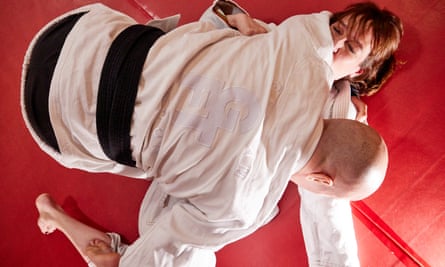As unlikely as this sounds, more than one person has tried to sell me on Brazilian jiu-jitsu as a feminist martial art but, from a distance, it seems to appeal more to a certain kind of man.
Most recently, Mark Zuckerberg revealed on his social media accounts this week that he had won gold and silver in a tournament. He joins various actors who may have confused themselves with their roles: Henry Cavill, who played Superman, Tom Hardy, of Mad Max: Fury Road fame, as well as Guy Ritchie, the director of King Arthur: Legend of the Sword. Russell Brand also enjoys the martial art, always at the front of the queue whenever anything fashionable and ostentatiously muscular – either physically or politically – is in the offing.
Pedro Garcia, the 44-year-old founder of PG Academy (“I’m so lucky I’m called Garcia,” he said, “because I just used my initials but now I can pretend it stands for Pure Grappling”), explains its popularity. “People do yoga, right? We call this involuntary yoga.” Wait, what? “Because I can make you bend.”
The sport came out of the Japanese diaspora in Brazil. One family in particular, the Gracies, founded an academy to teach a version of Kosen judo, which is predominantly ground work. Judo and jiu-jitsu, despite having a lot of similarities, have a critical fissure: “In judo, if you take someone down and you hold them for a few seconds, then you win; that’s the rule. But when you do jiu-jitsu, once you get to the ground, that’s when it continues.”
The majority of jiu-jitsu happens on the mats, and this isn’t considered very elegant or spectator-worthy by the martial arts purists who inhabit, for instance, Olympic committees. That doesn’t mean there’s not a competition circuit for jiu-jitsu. There is, and it reads like the grand tour of the international playboy: Miami, Rio de Janeiro, Paris. Zuckerberg won his title in Silicon Valley. His coach said afterwards: “He excels. He’s one of the best students I’ve ever had.” This annoys me, inexplicably: what’s it to me if Mark Zuckerberg is good at fighting?
I could tell you the rules, but this is not, by any means, a sport you could learn from a book. The overall principle is that you take your opponent’s strength and use it against them, to make them fall over, then carry on using their strength against them until they concede. It’s like physics, made of arms and legs. Core strength probably comes into it, I wouldn’t know.
READ RELATED: Target Memorial Day Sale 2023: Deals on Fitness, Bedding, More
You’re always trying manoeuvre yourself into a position where your strongest part is up against your opponent’s weakest, whether that’s a quicksilver wrist slipping away from their thumb or your hamstrings against their biceps. The advantage can flip in an instant, and there’s a mind-game element to it – sometimes it will suit you to make your opponent think they’re winning.

“It is a misconception,” Garcia says, “that this is a sport for supermen. It’s a misconception that you have to be big and strong.” He pauses to adjust that, slightly: “Obviously, it does help. But I have students that are maybe 60 kilos. I have a nurse in her 50s, very light, seems really sweet and friendly, but once she got the hang of it …” He shakes his head, awestruck. Even if you did go into it because you had delusions of greatness, the sport would soon shake you out of that. It’s very character building, Garcia says. If you lack confidence, you’ll gain it. If you’re arrogant, it will be good for you to have to surrender to someone much smaller or 20 years older.
The bit I’m really sceptical about, until I try it, is the workout potential: people always say it’s a 1,000-calorie-an-hour burner, and those stats are pretty unusual (for comparison, running would burn 700, strenuous cycling 600). But once you try it, well, you still won’t understand it, but you’ll believe it. Some combination of your bodyweight, your opponent’s, the mental agility you’re ideally deploying, the scrambley, anything-it-takes spirit, requires extreme physical exertion. There are other martial arts that will exhaust you faster – Thai kick-boxing is notorious – but if you want to get ripped without knowing quite how, do jiu-jitsu.
“We don’t hit,” Garcia says, “it’s only grabbing, grappling. Soon you realise that you don’t need to hit people, you can restrain, you can hold people and you still get the same buzz out of it.” It’s quite hard to get injured in jiu-jitsu: it’s unlikely to happen by accident. Pedro Garcia has never had an injury, in 16 years. You’ll probably only come to mischief through your own idiocy, by not conceding fast enough.
That may or may not be why the assorted bros like it. It’s feminist, by the way, because of the self-defence element, plus the fact that size isn’t always the deciding factor. But I ought to make clear that all martial arts people say things like that.





